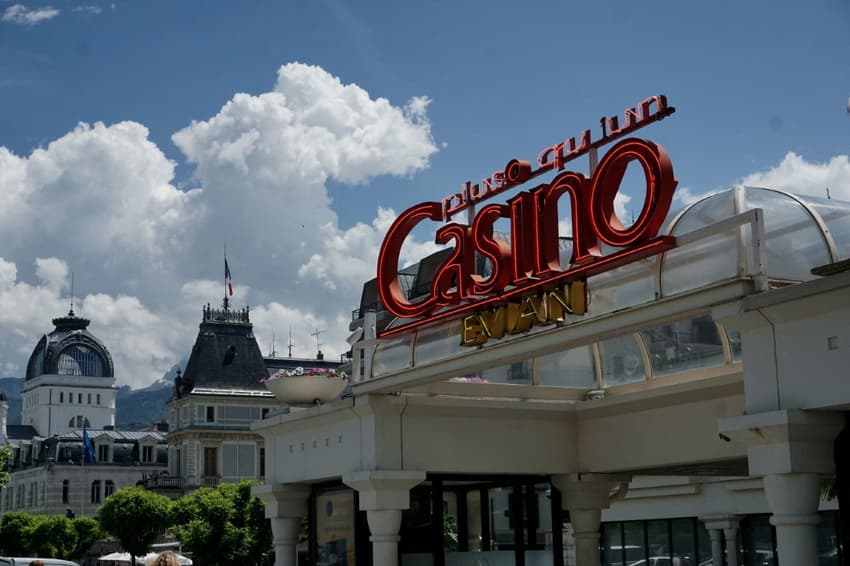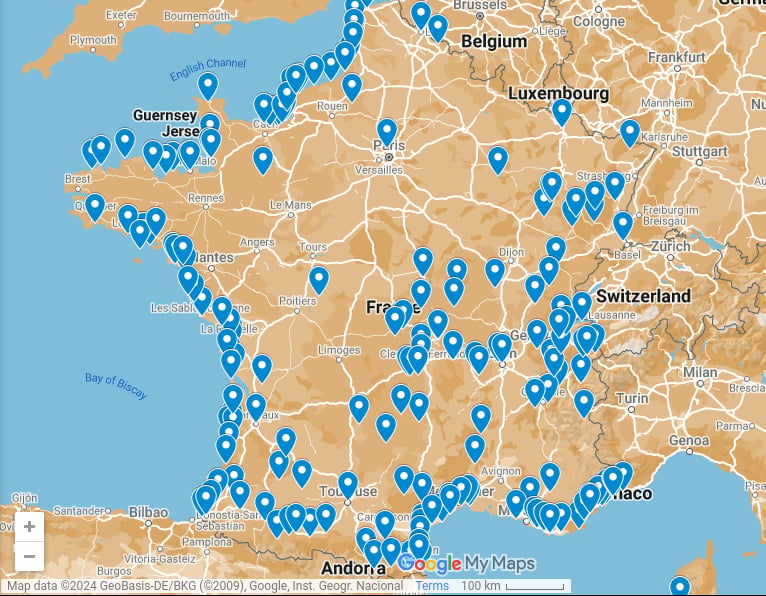MAP: Why are so many of France's casinos in seaside resorts?

There are more than 200 casinos in France, but most of them are in sea-side resorts or spa towns - a situation that we can thank Napoleon for.
France has strict rules that dictate where casinos are allowed to operate, and they date all the way back to Napoleon (as do a surprising number of modern French laws or regulations).
In the early 19th century, the French Emperor sought to regulate the practice of gambling and to discourage the growth of clandestine networks.
You can hear the team at The Local chatting about casino rules in this week's Talking France podcast - download here or listen on the link below
Tourist areas
As such, in 1806, Napoleon passed a decree restricting casinos to tourist locations - specifically seaside resorts and spa towns. Many French spa towns or former spa towns - often recognisable by the 'les bains' or 'les eaux' in their names - still have large casinos.
And the legacy of this law can still be seen today, with the modern casinos clustered along the coastline.

Map of the location of casinos in France. Map: Google maps - interactive version here https://www.casinos777.net/casinos-france.htm
Over time, more exceptions were permitted to the rules - a 1907 law that made official the existing rules and allowed for casinos to be opened in resorts in the mountains/ high-altitude tourist areas such as ski resorts.
Relaxation of rules
In the twentieth century the 'tourist areas' rule was relaxed and in 1988 the French government passed legislation to allow casinos to open in towns with more than 500,000 inhabitants, which led to places like Lyon and Bordeaux opening them.
As of December 2023, only 196 municipalities in France were permitted to host casinos, in keeping with the 'internal security code' article L.321-1.
Any new casino must be authorised by the French ministry of interior. As for other types of gambling, such as sports betting and poker, these activities are regulated by the autorité nationale des jeux (national authority of games).
Paris exception
One notable part of France without any casinos is Paris. In 1919, France banned any casinos within a 100km radius of the capital, legislation intended to combat gambling addictions.
However, an exception in 1931 allowed for one establishment to be opened in the greater Paris Île-de-France region - a casino in Enghien-les-Bains, located in the Val-d'Oise département, is therefore the only one in the Paris area.
It is located around 20km outside the capital, accessible via the suburban train network or via cycle paths leading out of the city.
Leader in Europe
Despite the strict regulations, France is a leader in Europe when it comes to casinos, with 202 across the country.
France counts about a third (32 percent) of the EU's total casinos, according to a 2022 report by the Cour des comptes (France's highest administrative court).
This proportion has decreased in recent years - as of 2016, France held onto closer to 40 percent of the EU's stock of casinos, according to reporting by TF1.
As a result of Napoleon's original rules, many of France's casinos are still located along the coastline, with notable locations along the Riviera or in Deauville, the famous resort town in north-west France.
38 French départements - (roughly one third of the country) mostly in northern and central parts of the country - were void of casinos entirely as of 2023.
Will there be more casinos in France?
In December 2023, French lawmakers voted in favour of allowing more exceptions to where casinos can be located, in an effort to "reduce territorial inequalities regarding the opening of casinos."
The exemptions were specifically aimed at areas that have an 'equestrian heritage', which might be classified as a historic (and modern) connection to horse racing, stud farms, or influential equestrian events - such as the historic horse-racing town of Chantilly.
MP Frédérique Meunier, from the Les Républicains party, told French media that these areas were targeted in order to help keep the equestrian sector alive, because it is "a major player in French culture (...) but it is disintegrating over time".
Allowing these towns to open casinos would help keep local economies alive, she said.
Similarly, communes that are part of an inter-municipal association (intercommunalité) with more than 100,000 people located in départements along France's border (départements frontaliers) will also be able to apply to open a casino, as long as there has not been one authorised in that département at the date of application.
Visitors to France's casinos are required to present either a French ID card or a passport, in order to verify that they are over the age of 18.
Comments
See Also
France has strict rules that dictate where casinos are allowed to operate, and they date all the way back to Napoleon (as do a surprising number of modern French laws or regulations).
In the early 19th century, the French Emperor sought to regulate the practice of gambling and to discourage the growth of clandestine networks.
You can hear the team at The Local chatting about casino rules in this week's Talking France podcast - download here or listen on the link below
Tourist areas
As such, in 1806, Napoleon passed a decree restricting casinos to tourist locations - specifically seaside resorts and spa towns. Many French spa towns or former spa towns - often recognisable by the 'les bains' or 'les eaux' in their names - still have large casinos.
And the legacy of this law can still be seen today, with the modern casinos clustered along the coastline.

Over time, more exceptions were permitted to the rules - a 1907 law that made official the existing rules and allowed for casinos to be opened in resorts in the mountains/ high-altitude tourist areas such as ski resorts.
Relaxation of rules
In the twentieth century the 'tourist areas' rule was relaxed and in 1988 the French government passed legislation to allow casinos to open in towns with more than 500,000 inhabitants, which led to places like Lyon and Bordeaux opening them.
As of December 2023, only 196 municipalities in France were permitted to host casinos, in keeping with the 'internal security code' article L.321-1.
Any new casino must be authorised by the French ministry of interior. As for other types of gambling, such as sports betting and poker, these activities are regulated by the autorité nationale des jeux (national authority of games).
Paris exception
One notable part of France without any casinos is Paris. In 1919, France banned any casinos within a 100km radius of the capital, legislation intended to combat gambling addictions.
However, an exception in 1931 allowed for one establishment to be opened in the greater Paris Île-de-France region - a casino in Enghien-les-Bains, located in the Val-d'Oise département, is therefore the only one in the Paris area.
It is located around 20km outside the capital, accessible via the suburban train network or via cycle paths leading out of the city.
Leader in Europe
Despite the strict regulations, France is a leader in Europe when it comes to casinos, with 202 across the country.
France counts about a third (32 percent) of the EU's total casinos, according to a 2022 report by the Cour des comptes (France's highest administrative court).
This proportion has decreased in recent years - as of 2016, France held onto closer to 40 percent of the EU's stock of casinos, according to reporting by TF1.
As a result of Napoleon's original rules, many of France's casinos are still located along the coastline, with notable locations along the Riviera or in Deauville, the famous resort town in north-west France.
38 French départements - (roughly one third of the country) mostly in northern and central parts of the country - were void of casinos entirely as of 2023.
Will there be more casinos in France?
In December 2023, French lawmakers voted in favour of allowing more exceptions to where casinos can be located, in an effort to "reduce territorial inequalities regarding the opening of casinos."
The exemptions were specifically aimed at areas that have an 'equestrian heritage', which might be classified as a historic (and modern) connection to horse racing, stud farms, or influential equestrian events - such as the historic horse-racing town of Chantilly.
MP Frédérique Meunier, from the Les Républicains party, told French media that these areas were targeted in order to help keep the equestrian sector alive, because it is "a major player in French culture (...) but it is disintegrating over time".
Allowing these towns to open casinos would help keep local economies alive, she said.
Similarly, communes that are part of an inter-municipal association (intercommunalité) with more than 100,000 people located in départements along France's border (départements frontaliers) will also be able to apply to open a casino, as long as there has not been one authorised in that département at the date of application.
Visitors to France's casinos are required to present either a French ID card or a passport, in order to verify that they are over the age of 18.
Join the conversation in our comments section below. Share your own views and experience and if you have a question or suggestion for our journalists then email us at [email protected].
Please keep comments civil, constructive and on topic – and make sure to read our terms of use before getting involved.
Please log in here to leave a comment.